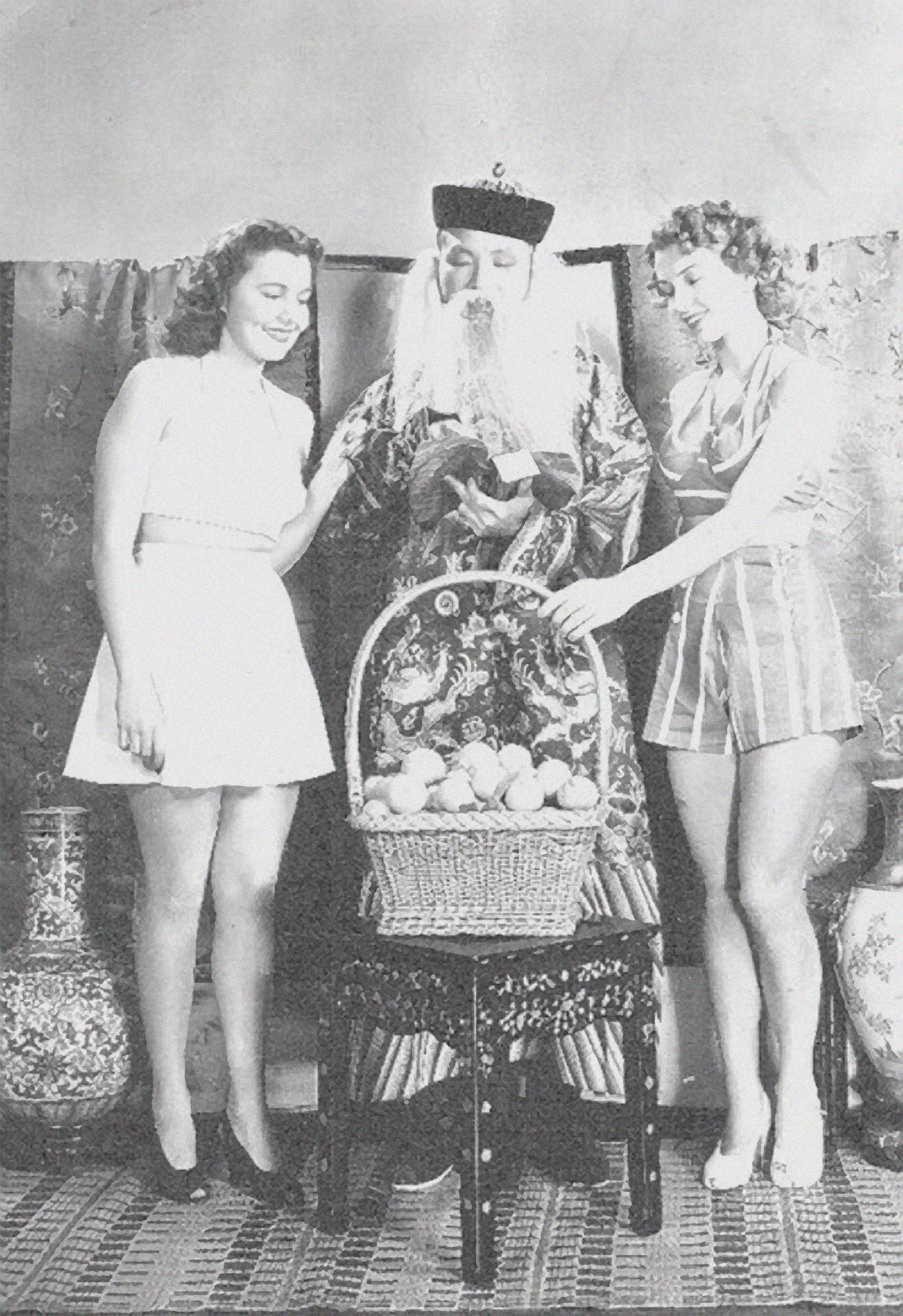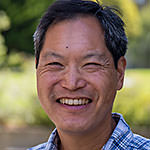
At the height of the Great Depression, my grandfather left his brothers and moved with his wife and first newborn child from Oakland to Los Angeles.
He wanted to be in Hollywood movies.
“That’s so gutsy!” I thought when my aunt shared this piece of family history. “To be an immigrant and still pursue big-screen dreams!”
My family only had two photos of my grandfather. One was his wedding portrait, and the other was a Hollywood still. We couldn’t locate the latter shot, and in my imagination, I recalled my grandfather as the evil character, Fu Manchu, with long whiskers dripping to a point at his chest.
In the 1930s, Fu Manchu was the only role a Chinese man could play. As an archvillain who masterminded the secret crime syndicate, Si-Fan, he was the primary stereotype Westerners had of the Chinese.
Yet when I found this photo again, I realized that my memory of my grandfather was quite wrong.
He didn’t look evil at all, but appeared more wise and serene, like an ancient sage.
In my own wistful fantasies about my Hollywood-actor grandfather, I had orientalized my own family.

Orientalism: Seeing the West and East as Mirror Images
Orientalism involves the ways that the West depicts the East. In academic discourses and media representations, the West views the East as its mirror opposite. Whereas the West is progressive and democratic, the East is traditional and barbaric. Western thought is scientific and logical, while Eastern thinking is superstitious and irrational. The West is superior and the East is inferior — polar opposites of one another.
My own binary thinking caused me to picture my grandfather as warped, ancient, and exotic. By extension, I saw myself in the same terms. The American side of myself was normal; my Chinese side was weird and out-of-date.
I fretted about my own identity, “Am I more American, or am I more Chinese?”
Perpetual Foreigner Microaggressions
Orientalism paints Asian Americans as perpetual foreigners because of our “Oriental” physical features. This racialization as outsiders clearly has consequences on our daily, lived experiences. Incidents of orientalized, outsider racialization include seemingly innocuous slights, but these microaggressions add up.
Classmates of my son recently drew back from him, because his home-packed lunch of dumplings smelled stinky.
A Spanish or French accent sounds romantic to Western ears, while a Cantonese or Tagalog accent often receives the irritated rebuke, “Go back to where you came from!”
Over time, we begin to sense that our Asian-ness is not normal. And if someone with an Asian cultural orientation wants to fit into a group, they paradoxically have to shed their Asian-ness in order to become normal in the U.S.!
Outsider Racial Profiling
Worse yet, Orientalism and outsider racialization shape our public policies and have devastating impacts on our communities.
In May 2015, FBI agents arrested Temple University Professor Xi Xiaoxing on charges of espionage and sharing secrets to China, but a few months later dropped all charges against Professor Xi. They never apologized or explained why he had been investigated, and Professor Xi was left with over $200,000 in legal fees. Racially profiled as a spy, Professor Xi’s only crime seemed to be that he was a Chinese American who maintained relations with his colleagues in China. He was one of four Chinese American scientists wrongfully arrested for espionage that year.
Government treatment of Asians as perpetual foreigners — in the name of national security — has sad precedents. From the internment of Japanese Americans in World War II to the law enforcement targeting of Middle Eastern, Muslim, and South Asian communities post-9/11, we remain suspect and disloyal.
Such differential treatment of foreigners is legal. Currently, thousands of legal, green card-bearing Southeast Asians in the U.S. are being rounded up, detained, and deported for felonies they committed decades ago. Even though they have already paid their sentences in prison, they are subject to double jeopardy — facing punishment twice for the same offense.
Vanna In, a Cambodian American from Fresno, California, spent seven years in prison after being tried as an adult for a gang-affiliated homicide. While in prison, he found freedom in Jesus Christ and turned his life around. Since being released, he’s worked with ex-gang members to secure them meaningful work, and currently serves as full-time youth minister. Yet, despite all this, Vanna faces permanent deportation from the United States, his only home since the age of 3.
Those facing deportation proceedings — including unaccompanied minors — stand before immigration judges without the right to a government-appointed attorney. The lack of due process results in thousands of individuals torn from their families without clear understanding of their hearings.
Indeed, these legal residents are deprived of their constitutional rights as American citizens simply because they’ve been racialized as outsiders.
Claiming Belonging
Confronted with the stereotypes and consequences of being perpetual foreigners, Asian American Christians often respond in one of two ways.
The first process of self-identification is to resolutely claim our American citizenship, that is, our sense of belonging to the U.S. We may try to out-white whites, by having sensibilities and values that are distinctly American. We might undergo therapy so that we can better differentiate from our authoritarian parents, and seek to be fully self-actualized individuals with boundaries, just like other “healthy Americans”.
Or we might take pride in the fact that we possess the best of both worlds — being American and Asian. We maintain ethnic pride in trendy foods, such as boba and poke bowls, while also staunchly defending our Americanness. When asked repeatedly, “Where are you really from?” we like to answer in perfect English, “From California ... in Oakland ... from the San Antonio neighborhood ... on East 16th Street.”
The trap of this self-identification, though, is that we become a model minority, a measuring stick used against other groups. We seek citizenship and belonging by trying to be like whites, while still being Asian. In the process, we tend to uphold the American empire, with its democratic, egalitarian tradition and its hubris of wealth and racism.
The second mode of self-identification is to identify simply as Christian. This transcendent approach to our racial identity may seem to be more biblical, as there is “neither Jew nor Greek” in God’s eyes.
But one problem with adopting a transcendent identity is that racial issues, such as those just discussed, are too easily dismissed. Instead of pursuing God’s justice and peace, Christians can feel they are above such concerns.
Further, the notion of a distinct, Christian identity is itself a chimera. We can never develop manners and norms outside of culture; to be human is to be shaped and shapers of a human culture. Our Christian life is expressed through culture.
How else, then, might we wrestle with an Orientalized racial identity?
Reclaiming Our identity as Strangers and Foreigners
Despite the negative historical connotations of being Orientals, and in light of the deleterious impacts of being racialized as outsiders, I suggest that Asian American Christians reclaim and reappropriate the identity of foreigners and strangers. This identity, too, is biblical and avoids the pitfalls of the other two ways of identification.
In Hebrews, the heroines and heroes of the faith acknowledged that they were “foreigners and strangers on earth”. As outsiders, they longed for a better, heavenly country and eschewed the temptations of this one. As foreigners, they remained undefiled by the trappings of empire and fought for kingdom values.
In contrast, I am sorely tempted to seek the status, prestige, and privilege of this empire. I dreamt that my grandfather was a Hollywood film star so I could then claim fame by association. I want the privileges of whiteness. Yet complicity with our racial order means that I perpetuate the injustices of our society. Do I really want to belong to a nation that treats its masses in such tragic ways — with mass incarceration, mass deportation, mass shootings, and mass disasters that are man-made?
Instead, by trying to remain distinct as exiles, rather than clamoring for belonging (even token Hollywood representation), we can be a prophetic witness to the American empire. This does not mean denying our ascribed identities. God can use our racial background for God’s good purposes.
Our marginalization as perpetual foreigners can be a gift. Through understanding our family’s immigration stories, we can learn how to be pilgrims in this land. By maintaining an exilic existence, we can distance ourselves from the snares of this world and remain undefiled. And by self-consciously identifying as Asian Americans, we can share our cultural gifts with the broader Church — gifts such as sacrificial and loyal love.
My grandfather never did become a Hollywood star, but he left me with a more powerful legacy: that of an immigrant who longed for a better country. May we Asian American Christians reclaim this status, as exiles and outsiders holy and wholly for God’s purposes.

Russell Jeung is the author of “At Home in Exile: Finding Jesus Among My Ancestors and Refugee Neighbors” (Zondervan 2016), in which he recounts his family’s six generations in California, how they reflect the racialized history of Asians in the U.S., and how he has come to terms with his own Asian American Christian identity. He founded Stop AAPI Hate with Chinese for Affirmative Action and the Asian Pacific Policy and Planning Council to counter surging Covid-19 racism.